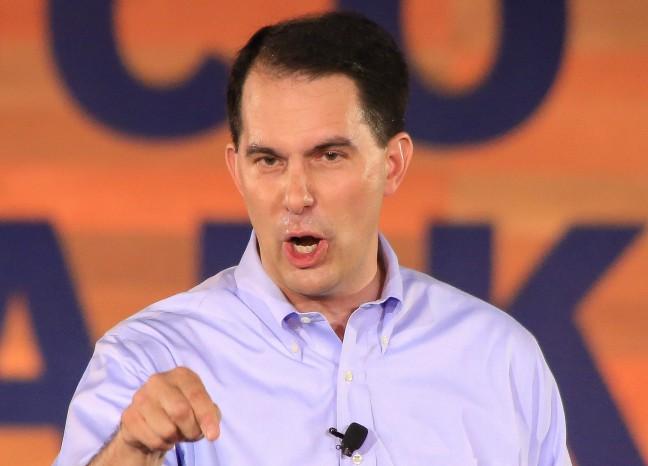Come 2018, Wisconsin will be in the midst of a mammoth political contest. Up for grabs in this crucial election cycle is the governorship of Wisconsin, currently held by the undefeated incumbent Gov. Scott Walker. Over the course of campaigns to become and retain the position of the state’s governor, he has handcrafted an armada of political power of stratospheric proportions, placing any challenger at an immediate — and perhaps insurmountable — disadvantage.
Gov. Walker has evaded some of the worst political bullets to be fired. Less than a year into his tenure as governor, the Wisconsin Democratic party coordinated a massive effort culminating in a recall election, which Walker won. He’s a survivor.
Experience matters because experience counts. There is no substitution to that breadth of skill and vigilance in the political ring. Building a campaign apparatus with those capabilities is even more important, and here, the governor has aid nationwide.
In the fight for his political life in the 2012 recall election, Walker expanded his donor outreach far and wide. With the help of 14 of the richest people in the United States — all but one outside of Wisconsin — Walker blasted Milwaukee Mayor Tom Barrett in the money column.
The Walker campaign employed the strategy of divide and conquer politics, as was heard between Walker and heavy campaign donor Diane Hendricks, who said “The first step is, we’re going to deal with collective bargaining for all the public employee unions, use divide and conquer.” And divide and conquer he did. After a slew of negative TV ads, false statements and the implementation of restrictive voter ID laws, the governor emerged victorious.
Whoever claims the mantle as the challenging candidate come 2018 would be foolhardy in rolling out the Mary Burke/Tom Barrett playbook. Neither was holistic or sincere enough to defeat the Walker strategy — and that lack of an all-encompassing vision played right into the hands of Walker.
They played his game and lost. If that candidate in 2018 is completely set on defeating Walker, it’s imperative that she or he — besides the necessity of having knowledge on campaigning — must adopt the complete opposite package from that of the Walker campaign.
Walker is a pure political creature, but the challenger must not be. Walker receives his war chest from crony elites masquerading capitalism as democracy — the challenger must reject that soundly in practice and rhetoric. Walker will divide Wisconsin to win it, but the challenger can only win Wisconsin by uniting it. In doing so, the challenger fulfills the role of Walker’s foil and successfully exposes the well-hidden demons in the Walker campaign fold.
Democracy is not a piñata for the rich and wealthy. Walker can recite how well his intended policies will benefit ‘the working man and woman’ because he ‘cares deeply for middle-class families,’ but there is no hunk of jargon so misleadingly false in all of Wisconsin politics. Middle-class families have been scorched under the Walker administration.
Massive corporations have reaped windfalls because of large tax cuts, while median wages are rising on a barely positive slope. And in nearly eight years as governor of Wisconsin, Walker has yet to fulfill his promise of 250,000 jobs, which he claimed would be generated in his first term.
Instead, he obliges his domestic policy with the demands of the real bosses: Large campaign contributors. Wisconsinites can see this in plain sight. They are sick and tired of being shafted while the recipients of corporate welfare acquire sweetheart deal after sweetheart deal.
Walker’s challenger needs the backbone he doesn’t have. Words are not enough, however, as it will require a truly grassroots campaign to forcefully repudiate crooked corporate cash and instead opt for small-dollar donations from the masses. This is the starting line for a positive, authentic campaign for real people with real lives in the real world.
Again, in stark contrast to Walker’s history of campaigns, it is a necessity that the challenger is a unifier, not a divider. Quite frankly, it’s pretty easy to be a divider. Talk about abortion while economic inequality ravishes the stagnating middle class. Talk about the (nonexistent) threats to the 2nd Amendment while climate change bears down upon humanity. Talk about the burden of working-class welfare recipients while the top one percent pocket tax breaks in the millions of dollars.
The people of Wisconsin deserve a candidate who will give rise to our better selves, instill hope and reclaim government for its rightful owner. The challenger must vigorously proclaim that no matter if you’re black, white, gay, straight, bisexual, poor or well-off, that we have a vested interest in a state to work in coordination for the vast majority, not the privileged few.
There must be an unwavering resolve from the challenger to refuse the Walker way in all its foul forms. It takes courage, it takes conviction, it takes a challenger.
Michael Sauer (mjsauer2@wisc.edu) is a freshman intending to major in political science.


